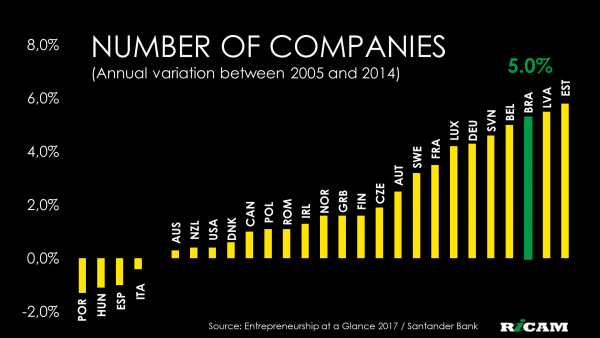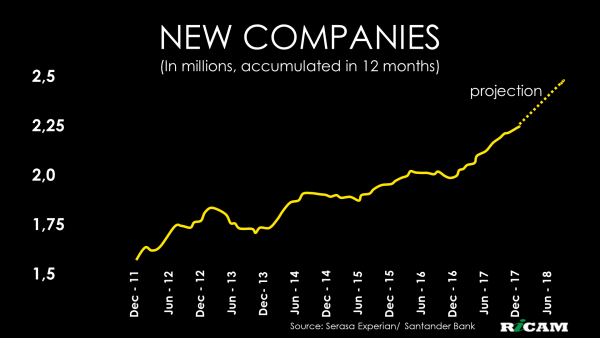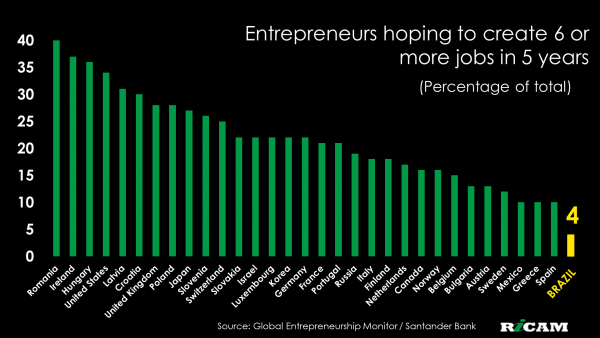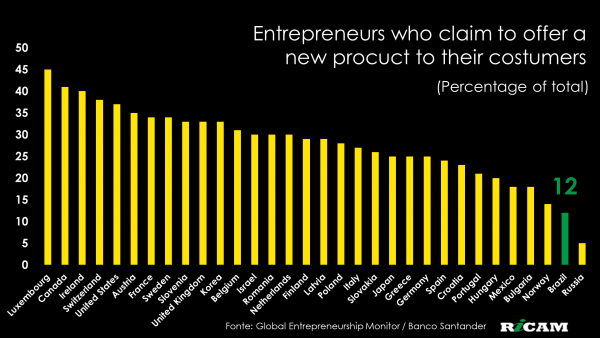05/2018
By Ricardo Amorim

Brazil was contaminated by a strong strain of entrepreneurship. In the last few years, thanks to the economic crisis millions of Brazilians opted for having their own businesses, driven by need and lack of alternatives. But the expansion of entrepreneurship in the country started long before.
According to the OECD, from 2005 to 2014 – therefore before the crisis – whereas the number of active companies dropped 1,3% a.a. in Portugal and 1% in Spain, and in the US it increased only 0.4% a.a., in Brazil it grew 5% a.a.. In 2018 alone, about 2.5 million companies will have been started in the country. This increases the productivity of the economy, since new companies replace and eliminate less productive ones from the marked. Whereas an average 18% of companies existing in the OECD were created in the last two years, in Brazil 35% of them are less than two years old.

Considering the business environment which exists in Brazil, particularly challenging to new businesses – with lots of bureaucracy, high taxation, low availability and high cost of financing, the figures are surprising. A change in behaviour took place in the Brazilian population which is reshaping the labour market in the country.

The creation of new businesses this year will be more than the creation of new formal and informal jobs, which is to be close to 2 million. Of this total, 1,3 million – or two out of three new jobs – will be created by new employers, self employed workers and micro and small businesses.
Something similar happened last year. Whilst the number of employers, self employed and informal workers increased 5%, the number of officially registered workers dropped 2%.
Brazil goes the way of developed countries, where self-employment has been growing for some time in view of new technologies and more flexible labour contracts. Here, the Labour Reform is expected to foster this trend even further.
On the other hand, if the willingness and courage to enterprise have grown in Brazil, ambitions are still rather shallow. According to the Global Entrepreneurship Monitor, only 4% of entrepreneurs in Brazil expect to offer 6 or more jobs in the coming 5 years. This compares to 10% in Mexico, 34% in the US and 40% in Romenia.

To make things worse, our entrepreneurship is little innovative. Only 12% of Brazilian entrepreneurs offer their clients a new or uncommon product, as compared to 18% of Mexicans, 37% of Americans and 41% of Canadians.

This suggests that many entrepreneurs go it alone in Brazil for lack of opportunities in large companies which require more qualified labour. The fact that one in each three Brazilian workers works for himself, twice as many as in developed countries, endorses this hypothesis.
The growth of entrepreneurship in Brazil is certainly good news, but the quality of the new enterprises still has to improve. It would be excellent to elect officers bringing plans to qualify the workforce, to invest more in research and development, to reduce bureaucracy – particularly the environmental legislation, the labour and the consumers codes – capable of improving legal certainty and the laws on intellectual property, free competition and bankruptcies, of reducing the complexity and size of the tax burden, and of facilitating access to new markets, opening up the Brazilian economy. If that comes, there’ll be no holding Brazil back.
Ricardo Amorim is the author of the best-seller After the Storm, a host of Manhattan Connection at Globonews, the most influential economist in Brazil according to Forbes Magazine, the most influential Brazilian on LinkedIn, the only Brazilian among the best world lecturers at Speakers Corner and the winner of the “Most Admired in the Economy, Business and Finance Press”.
Click here and view Ricardo’s lectures.
Follow me on: Facebook, Twitter, YouTube, Instagram e Medium.
Translation: Simone Montgomery Troula




